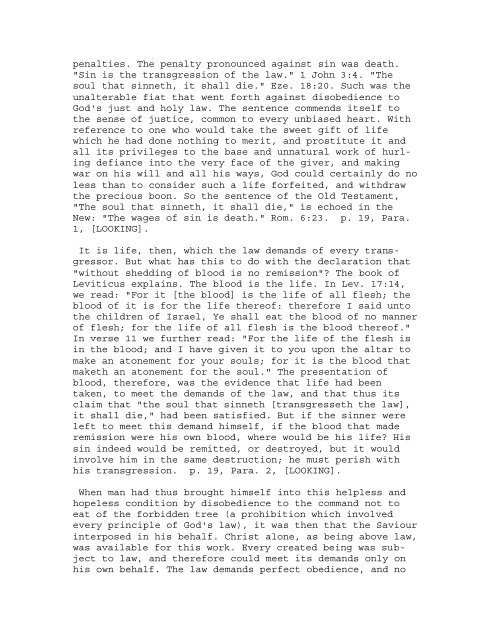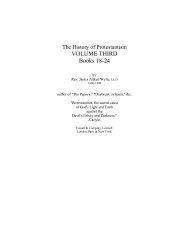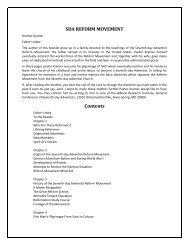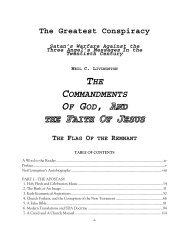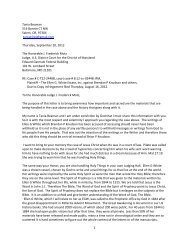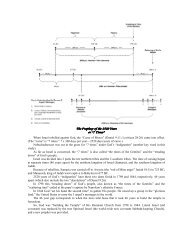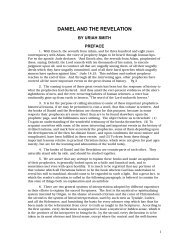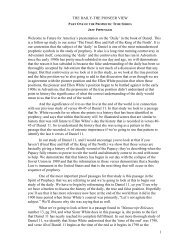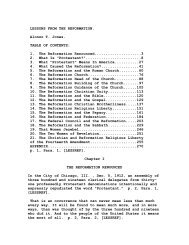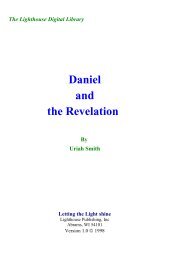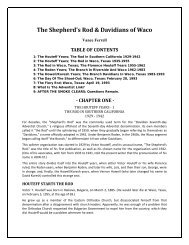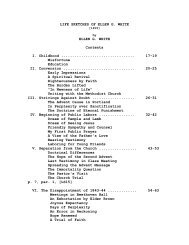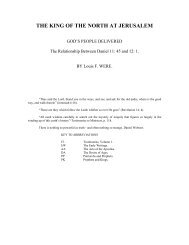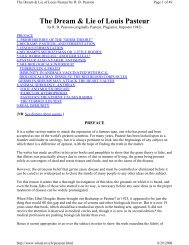LOOKING UNTO JESUS OR CHRIST IN TYPE AND ANTITYPE. BY ...
LOOKING UNTO JESUS OR CHRIST IN TYPE AND ANTITYPE. BY ...
LOOKING UNTO JESUS OR CHRIST IN TYPE AND ANTITYPE. BY ...
Create successful ePaper yourself
Turn your PDF publications into a flip-book with our unique Google optimized e-Paper software.
penalties. The penalty pronounced against sin was death.<br />
"Sin is the transgression of the law." 1 John 3:4. "The<br />
soul that sinneth, it shall die." Eze. 18:20. Such was the<br />
unalterable fiat that went forth against disobedience to<br />
God's just and holy law. The sentence commends itself to<br />
the sense of justice, common to every unbiased heart. With<br />
reference to one who would take the sweet gift of life<br />
which he had done nothing to merit, and prostitute it and<br />
all its privileges to the base and unnatural work of hurling<br />
defiance into the very face of the giver, and making<br />
war on his will and all his ways, God could certainly do no<br />
less than to consider such a life forfeited, and withdraw<br />
the precious boon. So the sentence of the Old Testament,<br />
"The soul that sinneth, it shall die," is echoed in the<br />
New: "The wages of sin is death." Rom. 6:23. p. 19, Para.<br />
1, [<strong>LOOK<strong>IN</strong>G</strong>].<br />
It is life, then, which the law demands of every transgressor.<br />
But what has this to do with the declaration that<br />
"without shedding of blood is no remission"? The book of<br />
Leviticus explains. The blood is the life. In Lev. 17:14,<br />
we read: "For it [the blood] is the life of all flesh; the<br />
blood of it is for the life thereof: therefore I said unto<br />
the children of Israel, Ye shall eat the blood of no manner<br />
of flesh; for the life of all flesh is the blood thereof."<br />
In verse 11 we further read: "For the life of the flesh is<br />
in the blood; and I have given it to you upon the altar to<br />
make an atonement for your souls; for it is the blood that<br />
maketh an atonement for the soul." The presentation of<br />
blood, therefore, was the evidence that life had been<br />
taken, to meet the demands of the law, and that thus its<br />
claim that "the soul that sinneth [transgresseth the law],<br />
it shall die," had been satisfied. But if the sinner were<br />
left to meet this demand himself, if the blood that made<br />
remission were his own blood, where would be his life? His<br />
sin indeed would be remitted, or destroyed, but it would<br />
involve him in the same destruction; he must perish with<br />
his transgression. p. 19, Para. 2, [<strong>LOOK<strong>IN</strong>G</strong>].<br />
When man had thus brought himself into this helpless and<br />
hopeless condition by disobedience to the command not to<br />
eat of the forbidden tree (a prohibition which involved<br />
every principle of God's law), it was then that the Saviour<br />
interposed in his behalf. Christ alone, as being above law,<br />
was available for this work. Every created being was subject<br />
to law, and therefore could meet its demands only on<br />
his own behalf. The law demands perfect obedience, and no


